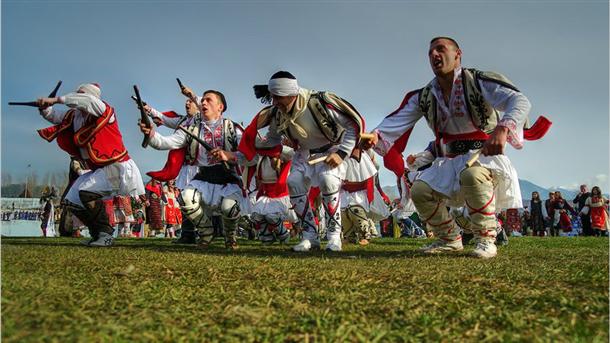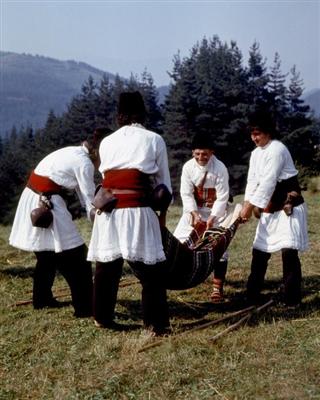In folklore, the rousalii are mythical females associated with plants and waters, not unlike ancient Greek nymphs. The same word however was used to denote ritual players (men) in one of the most intense customs in the Bulgarian lands.
The rousalii games are characteristic of Northern Bulgaria alone and are played during what is know as the Rousalska Week, the week starting on the Feast of the Holy Spirit, Pentecost, 51 days after Easter. In traditional culture this was the time of samodivi and rousalii (wood nymphs). They come to visit the world of humans on Spassovden, the Ascension of Jesus Christ. During the week of their festivities, they go for lively dancing and singing. The samodivi and rousalii are dual creatures – they have powers to help humans and cure disease but at the same time can become absolutely cruel to anyone who infuriates them. So, during Rousalsla Week various bans were observed. People refrained from work and sleep during the day, and had to avoid outings to the woods. If anyone came across the rousalii, their springs, meadows and anyplace they played their dances, he or she would be punished with the horrible rousalska illness. Those affected by it had seizures, lost weight and often died.
However, there are humans strong enough to treat the rousalska illness: the rousalii and the kaloushari. The ritual players performed several functions. On the one hand they toured villages and played dances aimed to bring health and fertility, similar to other folklore dancers like the mummers and the lazarki girls. On the other hand, they wrestled with demonic creatures that troubled the houses of village people, and were even able to banish them away. The most remarkable ritual however was the healing job performed by male rousallii. They moved in groups with an odd number of members, most often seven and had a chieftain called vatafin. He was the one who had the secret know-how and who introduced the rest to it. The vatafin selected carefully his fellows from among kind-hearted men, honest and able to keep a secret. To be initiated the rousalii had the go for some training first. Then they were sworn in and went through a sophisticated ceremony that sanctioned their right to practice healing. Those skills were usually passed down from father to son in only a limited circle of families and the process was veiled in deep secrecy.

© Photo: archive
While the Rouslaska Week was on, the rousalii were constantly together – they did not spend the nights in their homes, never talked to anybody, did not make the sign of the cross and did not step on water. Those bans signify the unusual, borderline state in which they were found – between the human and the yonder world. In this important zone of transition they were able to confront the creatures causing the illness and to defeat them thus helping the sick ones to survive and recover. The male rousalii wore a few attributes that likened them to ancient shamans. They had a special colorful stick, placed herbs on their caps and had bells attached to their ankles. The rousalii group had a special white flag decorated with magical herbs. The group’s leader carried a pot with vinegar and garlic. As with many other rituals, music was vital for creating the contact with the yonder world. The group of rousalii was always followed by a drummer and a flutist or bagpiper.

© Photo: archive
The treatment ritual followed the following pattern: the sick man would lie on the floor over a rug and the jug with herbs was placed by him. The rousalii started dancing around the sick man while the vatafin held the banner and led the group. At the start the dance was slow and gradually quickened. In the meantime, the rousalii found themselves in a special state, not unlike trance and hypnosis. Then they lifted the sick man with the rug and the vatafin massaged him with vinegar and gave him to drink from it. At that point the musicians started playing a special melody, Florichicka-ta that marks the peak of the ritual. The vatafin broke the jug with his stick, as the magic water from it sprinkled on those present. This was the right moment for the sick man to jump and run away, a clear demonstration of his recovery. The rousalii had to run too, except for one or two of them who had to collapse, as if the seizures had been transferred on them. The rest would then go back to help their brothers. The same actions were repeated as with the actual sick person, and the ritual closed.
Today the rousalii games can no longer be seen in their authentic version. At folklore festivals groups from Northern Bulgaria show reenactments of the custom. It continues to stir the curiosity of audiences and to put questions that science cannot answer even today.
Translated by Daniela Konstantinova
Lazarus Saturday is widely known in Bulgaria as Lazarovden , celebrated by Orthodox Bulgarians on the day before Palm Sunday. The main rite is the lazaruvane - a traditional custom centred on themes of love and marriage. Girls over the age of 16,..
The historic town of Tryavna will celebrate St Lazarus' Day, traditionally held on the Saturday before Palm Sunday. The Bulgarian custom, known as lazaruvane , is closely linked to the themes of love and marriage and will be re-enacted this..
The feast of the Annunciation (Blagoveshtenie in Bulgaria) is a holy day , a symbol of God’s infinite mercy to people and especially to women, blessed to bear new life, but also an embodiment of the eternal human longing for something better in the..
The historic town of Tryavna will celebrate St Lazarus' Day, traditionally held on the Saturday before Palm Sunday. The Bulgarian custom, known as..
Lazarus Saturday is widely known in Bulgaria as Lazarovden , celebrated by Orthodox Bulgarians on the day before Palm Sunday. The main rite is the..

+359 2 9336 661
